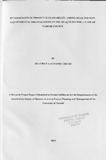| dc.description.abstract | This
purpose of this study was
to establish the
determinants of project sustainability among
NGOs
in the health sector; a case of
Nairobi County. Th
e study
was
guided by the following
objectives: To determine how income diversification influences
project sustainability among
NGOs
in the health sector;
To
establish
how
project conceptualization
influences
project
sustainability among NGOs
in
the health
sector;
T
o
explore how strategic planning influences
project sustainability among NGOs in the
health sector
and to assess the influence of monitoring
and evaluation on
project sustainability among
NGOs
in the health sector
. Descriptive survey
design
was
u
sed for the study. The target population
consisted
of
190
top, middle and low level
managers
in
these NGOs and beneficiaries of the projects that they implement.
The sample size
was
a total of
160
respondents
drawn from the
target population using the Kre
j
c
ie
and Morgan
’
s
table and systematic random sampling technique.
Questionnaires
were
used as instruments for
data collection.
Primary data from the field
was
edited first. Coding
was
then done to translate
question responses into specific categories. Codin
g organize
d
and reduce
d
research data into
manageable summaries. Quantitative data collected
was
analyzed by descriptive statistics while
content analysis techniques were
used to analyze qualitative data. Descriptive statistics such as
means, standard devi
ation, frequencies and percentages
was
used to describe the data. The
analyzed data
was then
presented in form of
tables.
On the influence of income diversification on
project sustainability, the respondents strongly agreed that income diversification infl
uences
project sustainability to a very great extent with a mean of
1.39 and a Standard Deviation of 0.49.
In terms of how project conceptualization influences project sustainability, the study
established
that project conceptualization influences the sust
ainability of NGO projects to a great extent with
a mean of 2.02 and a Standard Deviation of 0.54. In investigating the influence of strategic
planning on project sustainability, the study found that strategic planning to a very great extent
with a mean of
1.41 and a Standard Deviation of 0.70. In studying the influence of monitoring
and evaluation on project sustainability, the study found that M & E influences the sustainability
of NGO projects to a very great extent with a mean of 1.57 and a Standard De
viation of 0.50. In
conclusion, the study found that all the independent variables of the study which are income
diversification, strategic planning, project conceptualization and Monitoring and evaluation
influence project sustainability among NGOs. The s
tudy therefore recommends that NGOs
should diversify their income, engage beneficiaries and incorporate sustainability strategies
during project conception , have operational strategic plans and
integrate monitoring and
evaluations in their projects to ens
ure project sustainability . The
study recommends that more
research should be carried out on the same issues in other counties and also investigates
other
factors that have not covered in this study. | en_US |

